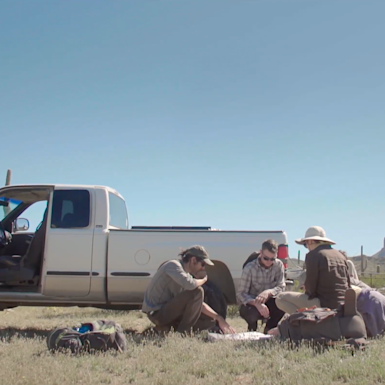90 mins • secondary/post-secondary
Criminalization of Aid
Objective: In Criminalization of Aid, students are asked to consider how offering assistance at the border is interpreted. In addition, students are asked to reflect on why aid workers who sometimes assist in the movement across borders have been criminalized for their actions.
Preparation: Read and reflect on Scott Warren’s Borders and the Freedom to Move before coming to the session.
Lesson Plan
Task 1: Introductory activity
25 min
Border Advocacy
Watch the New Yorker video about Scott Warren’s arrest for aiding people as they attempted to cross the US-Mexico border (16 mins).
When Humanitarian Aid is Considered a Crime

The New Yorker (2020)
As a class, have an opening/brainstorming discussion:
What is your initial reaction to Scott Warren’s story?
What are the different approaches that advocates and state officials took in this story?
What do people feel is at stake in such border crossings?
Task 2: Engaging oral histories
50 min
Border Advocacy
Both the US and Canadian governments have made moves over the past decade to criminalize assistance to asylum seekers. This is part of the context of the more recent border crossings from the US into Canada, where advocacy groups in border communities organized to assist people on the move. One such group developed a flyer to provide information to the thousands of people coming through their community.
5 min
A. Introduction
In 2016 when residents began hearing about asylum seekers crossing into Canada at Roxham road, June stepped into action. As one of the founding members of Plattsburgh Cares, June continues to deliver food and supplies to those in need.
Listen to the excerpt from June's Story - 43:28-45:15
June
"It's bearing witness. It's being there, it's really a gift."
00:43:28 - 00:45:15 • United States
In her interview, June talks about the flyer that Plattsburgh Cares produced for asylum seekers crossing into Canada. The following article shows how government officials responded to this flyer.
Fix Guide for Asylum Seekers, Ottawa Urges
iPolitics
30 min
B. Group Activity
Break into small groups and assign each group one of these three perspectives
Government official (Canadian and/or US)
Plattsburgh Cares advocate
Person thinking of crossing the border (hint for the instructor: prompt students to think about key concepts, e.g. smuggling, safety, humanitarian aid) In groups: 1. Read Plattsburgh Cares’ flyer
1. In your group read Plattsburgh Cares' flyer.
For Asylum Seekers Crossing into Canada
Plattsburgh Cares
2. From your assigned perspective discuss the following questions
a) How do you interpret the purpose of this flyer?
b) What stands out to you as important or problematic?
c) What questions does this raise about safety?
3. Keeping in mind June’s comments, the government response, and the flyer itself, come up with a three sentence statement that summarizes your position (based on your assigned perspective) on this flyer.
15 min
C. Full Class Debrief
Share and discuss your position with the class.
Task 3: Engaging oral histories
15 min
Wrap-up discussion
Reflect on Scott Warren's and June’s stories. These two advocates present different kinds of aid to migrants crossing the border. For Scott, water, food and shelter were given to border crossers in the desert at the US/Mexico border, whereas Plattsburgh Cares developed an informational flyer and provided aid at the border. In both cases, humanitarian aid was portrayed as potentially dangerous, clearly with dramatically different responses.
How do advocates define their work?
Why is it important to understand how advocates define their work?
What is the danger of criminalizing such work?
What can be learned from looking at the stories of advocates at these borders?